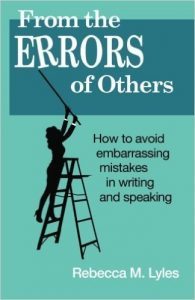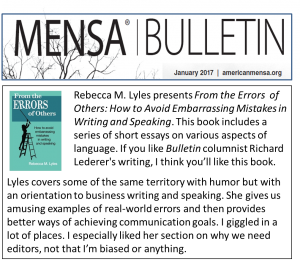Rebecca Lyles's Blog
January 12, 2017
Mensa Bulletin Review
November 17, 2016
Kirkus Reviews
 More kind words from reviewers:
More kind words from reviewers:
“A lively, humorous debut compendium of communication “don’ts.” In this highly readable debut, Lyles, a business-communication consultant with three decades of technical writing experience, documents the many misspellings, grammatical blunders, and ill-advised expressions that bedevil business writing and speech. The very short, self-contained essays make it easy to consume the book a few pages at a time. The author offers short chapters that specifically address public speaking, advertising, and wordplay, among other areas.
Along the way, she covers a wide range of common errors, from the general (when to use “principle” or “principal,” for example) to the business-specific (how to create appropriate text for a presentation slide) to the everyday (examples of grammatically incorrect newspaper headlines). This multitude of examples is impressive enough, but the author’s keen observations are what lift the book above an ordinary collection of bloopers. Lyles has the ability to highlight the most egregious errors while also treating them with good humor, rather than snarky sarcasm. In “Telltale Signs,” for example, she refers to actual signs she’s seen and answers them with signs of her own. For example, she answers “Shirts and Shoes Must be Worn” with “But Your Pants Can Be Brand New” and “Prepare to Stop When Flashing” with “At Least Button Trench Coat.” Her take on online-dating phrases is perceptive and hilarious; for instance, she says that when a man writes that he enjoys “Long walks on the beach…quiet evenings by the fire…candlelight dinners at home,” he really means “I’m cheap and I’ll never take you anywhere. And I expect you to cook.” Lyles is also sensitive to inflated speech patterns; she warns readers of potentially deceptive qualifiers, such as “To be perfectly honest” and “If you want to know the truth,” among others. This is an amusing, on-target collection, crafted in a way that makes it easy to laugh at one’s own shortcomings.”
A clever, engaging, and delightful look at how people can be lax with the written and spoken word.
— Kirkus Reviews
October 26, 2016
Portland Book Review
This five-star rating and review appears November 1 on their website. The review for From the Errors of Others will appear on our website as seen below. The book received 5 stars.
The review for From the Errors of Others will appear on our website as seen below. The book received 5 stars.
Effective communication is a skill that everyone wants but can be hard to develop. In a collection of short, humorous essays, Rebecca M. Lyles carefully articulates the do’s and don’ts of effective communication in her work From the Errors of Others. As an experienced editor, Lyles brings years of experience into the work, including witty anecdotes to liven the reading. Especially in professional settings where a misspoken word or incorrectly placed comma may produce ill effects, learning to convey what you mean to say correctly carries much import. Focusing on the specifics of language and tone in both spoken word and written forms of communication, from emails to twitter posts, Lyles brings the focus back to basic communication without all the pretentiousness that autocorrect and suggested synonyms bring.
Besides the clear lessons taught in this collection, Lyles also possesses a strong sense of awareness for the reader. While From the Errors of Others contains dozens of lessons, a reader can easily read the entire work in one sitting. Lyles possesses the capacity to thoroughly entertain her intended audience while educating them about the topic at hand. Her frank voice and humor lend themselves towards helping the reader’s general interest in a topic generally considered dense and dry in nature. Short, succinct chapters provide direct and clear meanings, some in the forms of anecdotes with critical morals and lessons that would benefit those who don’t possess the power of eloquent but straightforward communication. Readers seeking to create more effective communication in professional settings, as well as in everyday conversation, should take lessons from Lyles’ work to heart; the colloquial manner in which Lyles executes the lessons provides context for the utilization of techniques. Regardless of how well one communicates, From the Errors of Others should be a work read by everyone who wants to learn effective communication.
October 13, 2016
Midwest Book Review
October 2016
The Writing/Publishing Shelf
From the Errors of Others
Rebecca M. Lyles
Archway Publishing
1663 Liberty Drive, Bloomington, IN 47403-5161
www.archwaypublishing.com
9781480828476, $42.95, HC, 394pp, www.amazon.com
Synopsis:
“From the Errors of Others: How to Avoid Embarrassing Mistakes in Writing and Speaking” is an informative collection of crisp, witty, and slyly informative essays for grownups with a sense of humor by technical writer and editor Rebecca M. Lyles. The focus is on communication including the good, the bad, and the patently bizarre. “From the Errors of Others” is as entertaining a read as it is informed and informative as aspiring writers and speakers learn how to: keep a professional tone; avoid awkward writing and speech habits; communicate clearly without being pretentious; detect deception; and use a writing comfort zone.
Critique:
Impressively well written, organized and presented, “From the Errors of Others: How to Avoid Embarrassing Mistakes in Writing and Speaking” is an extraordinary compendium of insight, experience, advice, and thoroughly ‘reader friendly’ commentary. While very highly recommended for community and academic library Writing & Speaking instructional and reference collections, it should be noted for students, aspiring writers, novice speakers, and non-specialist general readers with an interest in the subject that “From the Errors of Others” is also available in a paperback edition (9781480828469, $23.99) and in a Kindle format ($3.99).
October 11, 2016
Publishers Weekly Review
Reviews

If composition class made you squirm and grammar lessons caused an uneasy feeling in the pit of your stomach, relax, readers! Lyles shares a friendly, chatty guide to written and spoken communication. Drawing on her 30 years of experience as a writer, editor, and manager for technology companies, her guide covers grammar but also includes practical advice, such as how to create an effective online profile, and taking simple steps to ensure you’re saying what you mean to. To keep things light, Lyles provides plenty of entertaining bloopers. Her material cuts a wide swath: PowerPoint slides, credit card statements, even customer-service rep scripts. Writing, language, tone: as one chapter title states, it’s “All in the Delivery.” As the author reminds us, mistakes can “make you look stupid,” language can be used “as an important litmus test,” and pronunciation matters. Organized into 11 sections, the book is made up of concise, two- and three-page essays with titles such as “Borrowing from Other Languages” and “Me, Myself, and I.” Readers of all ages and grammar levels will find this an easy and entertaining reference, and a valuable reminder that spellcheck and autocorrect aren’t always your best friend. (BookLife)
Dr. Richard Nordquist, About.com Grammar and Composition expert
“From the Errors of Others is a collection of crisp, witty, and slyly informative essays for grownups with a sense of humor. The subject is communication—good, bad, and patently bizarre. The author is Rebecca Lyles, an experienced editor but not a wrist-slapping schoolmarm. Neither giggly nor ponderous, she eagerly tells tales out of school. There are boneheads and blowhards in our midst, she says, but we don’t have to take them seriously. And we certainly don’t have to imitate them.
From the Errors of Others is a refreshing alternative to those heavy handbooks we never opened in school. It’s not only far more entertaining than those dreary tomes, in the end, perhaps surprisingly, it’s also much more enlightening. Imagine that: a smart book about writing and speaking effectively that people will actually enjoy reading.”
June 25, 2016
Vapor-speak and Vaporware
 Does anyone remember Vaporware?
Does anyone remember Vaporware?
The nineteen-eighties were like the Wild West in software development. Small companies sprouted like crabgrass, each promising an amazing new product. Many of these startups didn’t last long. Maybe it was because they sold Vaporware.
Vaporware was an idea or a half-developed program that didn’t exist yet. Some entrepreneur scraped together a little capital, formed a software company, and hired a few sales reps. They created ads with pictures of (empty) 5-1/4-inch floppy disks bearing the company logo, next to a computer.
The programmer, often the business owner’s kid, was still trying to figure out how to make the program work. It was not a scam … they just overestimated their own skill and underestimated the development time. But the company boldly sold the product with a promise of “thirty to sixty days” to delivery. Usually, after about ninety days of the same story, the customers wised up, the sales evaporated, and so did the company.
Why would anyone fall for that? It was an unsophisticated time. Interactive processing was new, no one had personal computers yet, and there was no such thing as the Internet. No Microsoft, not even graphical user interfaces. This new thing called software promised small businesses a way to be more modern and efficient. They couldn’t see it, they didn’t understand it, but they wanted it. Sellers learned to talk about their phantom products without committing to specific features or delivery dates.
People today are more savvy and they don’t buy Vaporware anymore, but the techniques we used to sell it are still around. They have just morphed into Sales and Marketing Vapor-speak. It sounds trendy, but if you use Vapor-speak, it can suggest that you’re being dishonest or trying to hide something. Here are some of the major offenders:
It’s all about
With X product, it’s all about delivering customer service and improving your return on investment.
What, exactly, is it? Are we referring to promised benefits here? Are you saying the product delivers them? All about doesn’t promise anything. If I were a potential customer, I’d be all about shopping elsewhere.
Around
Product X addresses issues around security, audit trails, and data storage.
Issues around these items? Does that mean problems inherent in them? Directly concerning them? Peripherally related to them? If you can’t be clearer than that, I wonder if you understand your product.
Ecosystem
Our goal for the coming year is to improve the business process ecosystem.
Unless you’re talking about all the water, air, soil, plants, and living organisms in a defined physical space, you’re hijacking a word and using it where it doesn’t belong. Is it a department, a market, an industry? In a business sense, ecosystem is so vague it means nothing at all.
Retail businesses could not get away with Vapor-speak. Just imagine you were buying tires for your car. You ask the dealer, “Are they safe and do they come with a guarantee?” How would you feel about this response:
In our business, we’re all about the tires. Our tires focus on questions around tread wear and traction, and we guarantee that we’re part of the automobile safety ecosystem.
You might ask if they accept Vapor-cash …
∗∗∗∗∗∗∗ Dear readers ∗∗∗∗∗∗∗
 This is the last regular weekly post to this blog. In the future, occasional new TextCPR posts will appear here and on Facebook. Thanks for nearly four years of readership and engaging comments.
This is the last regular weekly post to this blog. In the future, occasional new TextCPR posts will appear here and on Facebook. Thanks for nearly four years of readership and engaging comments.
The spirit of this blog is now captured in a book: From the Errors of Others, available online at these links:
Richard Nordquist, Grammar and Composition expert for About.com, says:
“From the Errors of Others is a refreshing alternative to those heavy handbooks we never opened in school…. Imagine that: a smart book about writing and speaking effectively that people will actually enjoy reading.”
June 18, 2016
Raining on parades
 To compliment someone, say that she loves everyone, she never met a stranger, or her smile would light up a room. The world loves cheery, trusting, optimistic people.
To compliment someone, say that she loves everyone, she never met a stranger, or her smile would light up a room. The world loves cheery, trusting, optimistic people.
Sadly, the Internet provides a vehicle for infinite ways to prey on those day-brighteners. People who always see the best in others. Who always believe the sun will come out tomorrow. If you’re one of those, I’m going to drop some precipitation on your parade.
Often, no harm will come to you if you believe a scammer. Well, unless you count snickering from your friends and family. But some tricksters draw you in and then they go after your money or information.
Examples:
I saw the most heartwarming/scary/simply AMAZING video clip!
Some are true, but many are staged. Did you ever wonder how someone just happened to be there with a camera to capture it? (Especially if it’s shot inside a car?) Harmless, unless you’re invited to contribute to some “cause.” Clicking or sharing can place you on a targeted list for other scams.
Statistics show that my new blog/music video/website has views from all over the world!
Most likely spiders, bots, and web crawlers used for indexing. Or cybercriminals after your identity or credit card information. Your web stats just record total hits, not necessarily instant worldwide fame. Do you honestly think Russia and Eastern Europe constitute your fan base?
Congratulations! You’ve been named one of the Top Hundred Excellent [fill in the profession] in your state!
For $19.95, you can purchase a plaque with your name on it, and for $39.95 you can buy a book listing the Top Hundreds for every state in the country. Buy one for each of your children! Who nominated you? What is the “organization” conferring this honor?
If you point out that the emperor has no clothes, you risk being perceived as negative and pessimistic. But if you have any sort of Internet presence that tracks comments, you know how much spam and other deceptive communication is out there.
Most (spam) comments I receive involve cheap knock-off sunglasses, fake designer handbags, and SEO services. The subject line is eye-catching, but the message is gibberish. Some are unintentionally, but genuinely, hilarious. The goal is simply to get you to open the message.
So enjoy your parade, but take an umbrella. And remember that this message, like many others I deleted, appeared in the stats for this blog:
This system helps cat owners understand their cats better by discussing reasons why cats urinate outside their litter box.
I don’t even have a cat.
∗∗∗∗∗∗∗ Dear readers ∗∗∗∗∗∗∗
 The last weekly post to this blog will be July 3, 2016. After that, see TextCPR on Facebook for occasional new posts. Thanks for nearly four years of readership and engaging comments.
The last weekly post to this blog will be July 3, 2016. After that, see TextCPR on Facebook for occasional new posts. Thanks for nearly four years of readership and engaging comments.
The spirit of this blog is now captured in a book: From the Errors of Others, available online at these links:
Richard Nordquist, Grammar and Composition expert for About.com, says:
“From the Errors of Others is a refreshing alternative to those heavy handbooks we never opened in school…. Imagine that: a smart book about writing and speaking effectively that people will actually enjoy reading.”
June 11, 2016
Insulting with pronouns
 Pronouns (he, she, it, they, his, her, its, that, them, this, for example) are useful shortcuts. They allow us to avoid saying:
Pronouns (he, she, it, they, his, her, its, that, them, this, for example) are useful shortcuts. They allow us to avoid saying:
Sir William Willingham Shropshire has assumed leadership of The International Institute for Global Peace, and the annual meeting of the International Institute for Global Peace was held at the estate of Sir William Willingham Shropshire.
Instead, we can say:
Sir William Willingham Shropshire has assumed leadership of The International Institute for Global Peace and hosted its annual meeting at his estate.
The handy pronouns its and his enabled us to avoid repeating two long and clumsy phrases. But writers, tossing around pronouns with no concern for where they land, often confuse us with unclear pronoun references. Sometimes the ambiguity even results in an unintended insult. Watch for these errors the next time you read a newspaper, magazine, or online article.
Examples
Because the representative is less committed to saving money than drafting legislation, she sometimes overlooks it.
What does it mean? Does she overlook drafting legislation or saving money? Here’s how the sentence might have been clearer:
The representative sometimes overlooks saving money because she is committed to drafting legislation.
Stewart has a great vocabulary. That is how he is able to convince people he is smart.
Pronouns have to refer to something. That suggests an action, but it has no referent in the first sentence. Simply having a good vocabulary does nothing to convince anyone of anything. Here’s a clearer version:
Stewart uses his great vocabulary to convince people he is smart.
The bride told the maid of honor she hated her dress because it made her look fat.
Is the bride referring to her own dress or to the bridesmaid’s dress? This is either an insecure bride or a snarky bridezilla who doesn’t deserve an honor attendant. Let’s hope it was this one:
The bride told the maid of honor, “I hate my dress. It makes me look fat.” […followed by reassurances that she is beautiful and this is her special day …]
My friend’s dad told me his pet peeve was a guy who confuses pronouns, just like he does. But, as he always says, he’s an idiot and his opinion has never mattered much to him.
Insulting with pronouns. See how easy that is?
∗∗∗∗∗∗∗ Dear readers ∗∗∗∗∗∗∗
 The last weekly post to this blog will be July 3, 2016. After that, see TextCPR on Facebook for occasional new posts. Thanks for nearly four years of readership and engaging comments.
The last weekly post to this blog will be July 3, 2016. After that, see TextCPR on Facebook for occasional new posts. Thanks for nearly four years of readership and engaging comments.
The spirit of this blog is now captured in a book: From the Errors of Others, available online at these links:
Richard Nordquist, Grammar and Composition expert for About.com, says:
“From the Errors of Others is a refreshing alternative to those heavy handbooks we never opened in school…. Imagine that: a smart book about writing and speaking effectively that people will actually enjoy reading.”
June 4, 2016
That hidden fat
 In this age of body-shaming, no one wants to use words like bony, scrawny, chubby, pudgy, or fat. We say slim, willowy, curvy, big-boned … euphemisms to avoid making people feel awkward about their physiques. But when it comes to writing, almost everyone needs a wakeup call, even if it hurts.
In this age of body-shaming, no one wants to use words like bony, scrawny, chubby, pudgy, or fat. We say slim, willowy, curvy, big-boned … euphemisms to avoid making people feel awkward about their physiques. But when it comes to writing, almost everyone needs a wakeup call, even if it hurts.
Your writing is probably fat. Sorry, but there’s no other word for it. We all use meaningless clichés without even realizing it. They’re part of our conversational vocabularies, and they creep into our writing like midnight refrigerator raids. You ask, “Why should I care? I’m not a swimsuit model – I mean – professional writer!” Perhaps not. But you might write emails, business reports, letters to the editor, announcements, notices, or bulletins for the Cub Scouts.
The trouble with fat writing is that the extra words dilute your message and subtract from its meaning. Readers get bored and stop paying attention.
To guard against releasing fat writing into the world, self-edit before you publish or send. These examples of voluminous verbiage show what to look out for, and what you could say instead:
so on and so forth (so on)
first and foremost (first)
last but not least (last)
over and over and over again (repeatedly)
far and away (clearly)
in some form or fashion (somehow)
And you can usually leave these out altogether:
as a matter of fact
as I said before
at the end of the day
it goes without saying that
for all intents and purposes
to tell you the truth
I know you’re not shallow and it’s not for vanity’s sake. I’m concerned about your health and want you to have a long and successful (writing) life.
So cut out the F-word, fat, and flex those nouns and verbs. Your writing might even make it to the Sports Illustrated cover.
∗∗∗∗∗∗∗ Dear readers ∗∗∗∗∗∗∗
 The last weekly post to this blog will be July 3, 2016. After that, see TextCPR on Facebook for occasional new posts. Thanks for nearly four years of readership and engaging comments.
The last weekly post to this blog will be July 3, 2016. After that, see TextCPR on Facebook for occasional new posts. Thanks for nearly four years of readership and engaging comments.
The spirit of this blog is now captured in a book: From the Errors of Others, available online at these links:
Richard Nordquist, Grammar and Composition expert for About.com, says:
“From the Errors of Others is a refreshing alternative to those heavy handbooks we never opened in school…. Imagine that: a smart book about writing and speaking effectively that people will actually enjoy reading.”
May 28, 2016
Because or despite?
 Ah, the power of ego. It can make people do (and think) outrageous things in business.
Ah, the power of ego. It can make people do (and think) outrageous things in business.
Consider the blowhard who brags about his success, attributing it to some off-the-wall notion that runs contrary to conventional wisdom … precisely because it runs contrary to conventional wisdom. It’s not an expression of creativity, but rather a misguided assignment of cause and effect. The idea that the presence of two factors assumes one to be the result of the other.
For example:
“I’m CEO of a bussiness. I’m richer than you cuz I don’t waist time on writing and that kind of nonsence.”
The CEO’s success might be well earned, a result of good business instincts, wise decisions, great support staff, favorable economic conditions, a niche product, or inherited wealth—despite the poor communication skills. If success were the result of ignorant writing and speech, we would be a country of zillionaires. Just in case, I recommend being aware of (and always trying to improve) your communication skills. It might not be a guarantee of success, but it won’t hurt.
Remember an NBA player, back in the eighties and nineties, named Spud Webb? At five feet seven (that’s right – five, not six), he had a staggering 42-inch vertical leap. In 1986 he won the NBA Slam Dunk Contest. Webb’s accomplishments were impressive despite his height, not because of it. Coaches did not immediately start to recruit the shortest players they could find, because no one else was Spud Webb.
My favorite real-life example of because vs. despite confusion comes from a small company where I once worked. We needed a new receptionist/typist. Our know-it-all business owner had previously worked with a secretary who had long fingernails. They extended perhaps a quarter-inch beyond her fingertips. She was also professional, personable, intelligent, and she somehow typed accurately despite the long-ish nails. But she was so good at her job that Mr. Big inexplicably equated her success with having long fingernails. Apparently the longer, the better—like Samson’s hair. And how clever of him to discover it!
When the interviews for our receptionist/typist position began, one candidate stood out from the rest. Not because of her skills, but because of her nails. They were at least two inches beyond her fingertips. They curved downward and were painted in neon colors. One nail sported multicolored stripes, two glued-on googly eyes, and a tuft of fur. It was, she explained, “Toucan Sam from the cereal commercial.” The office was abuzz with whispered questions: How does she button a coat? Eat French fries? Brush her teeth? How does she … oh dear.
But The Boss was so enchanted that he hired her – on the spot – without a typing test, a spelling test, or any other objective measure of her suitability for the job. Because he alone knew the secret to finding a good receptionist/typist.
Guess how that worked out.
Like TextCPR on Facebook !





